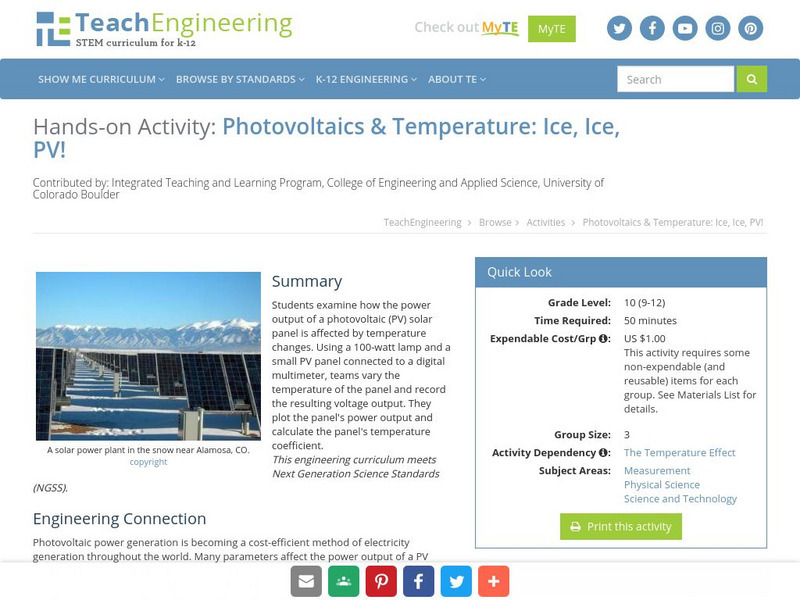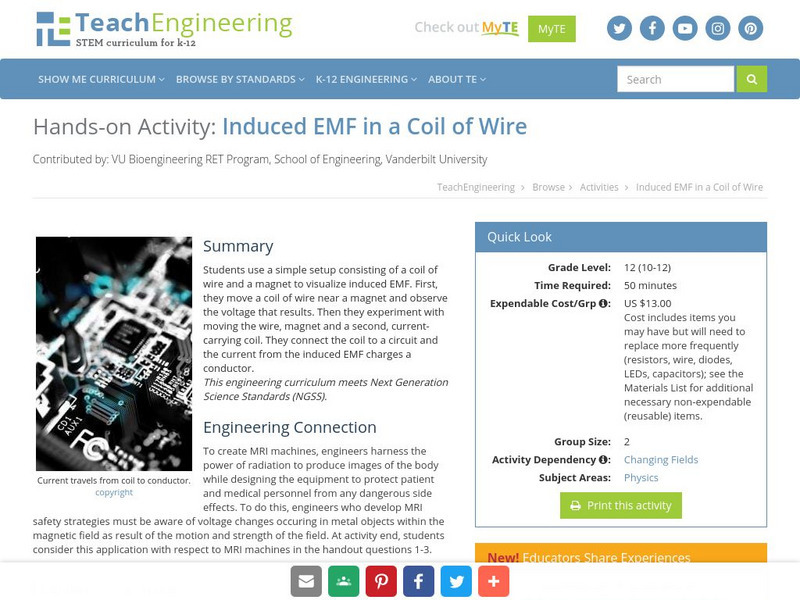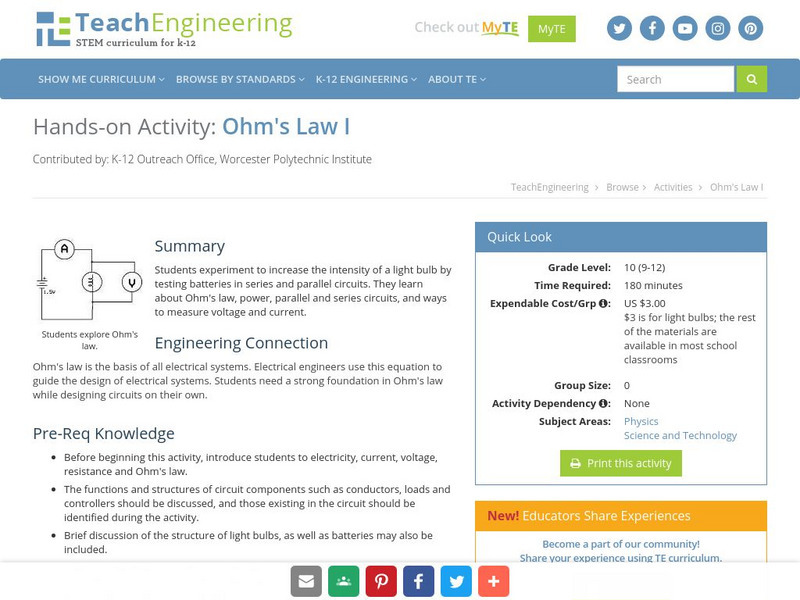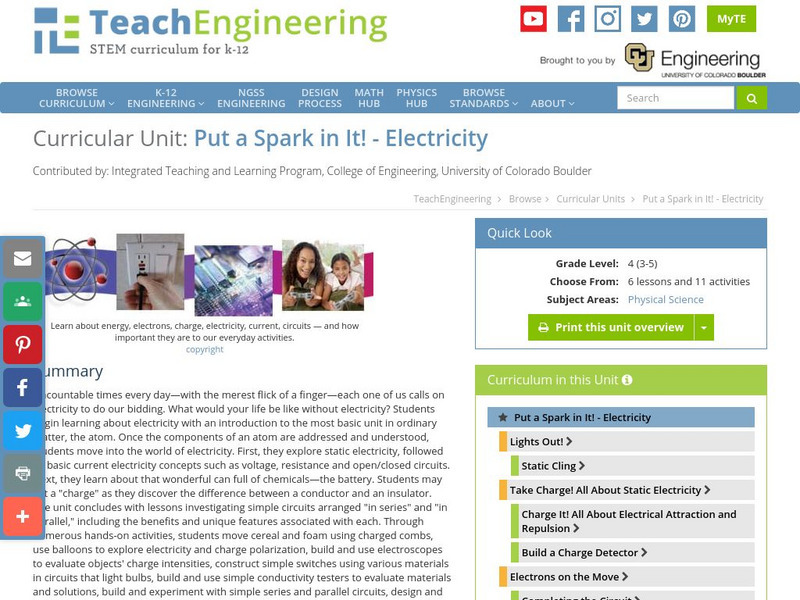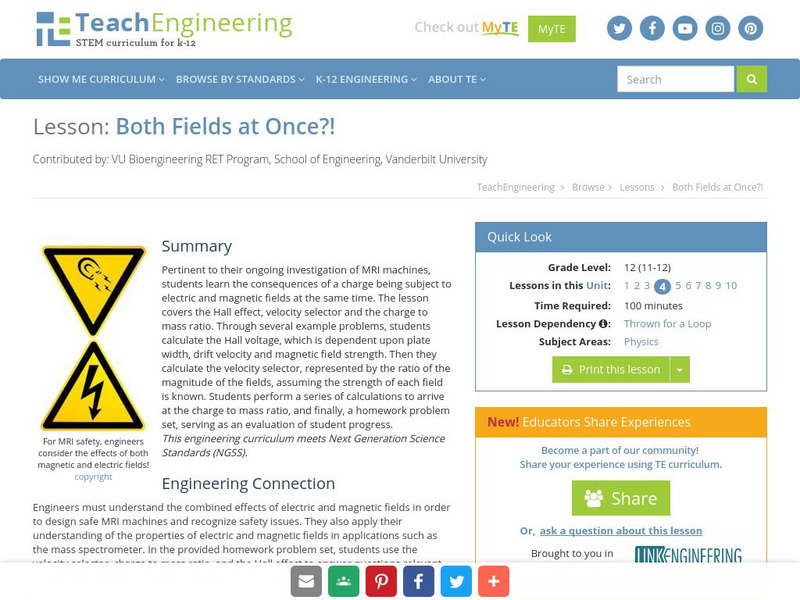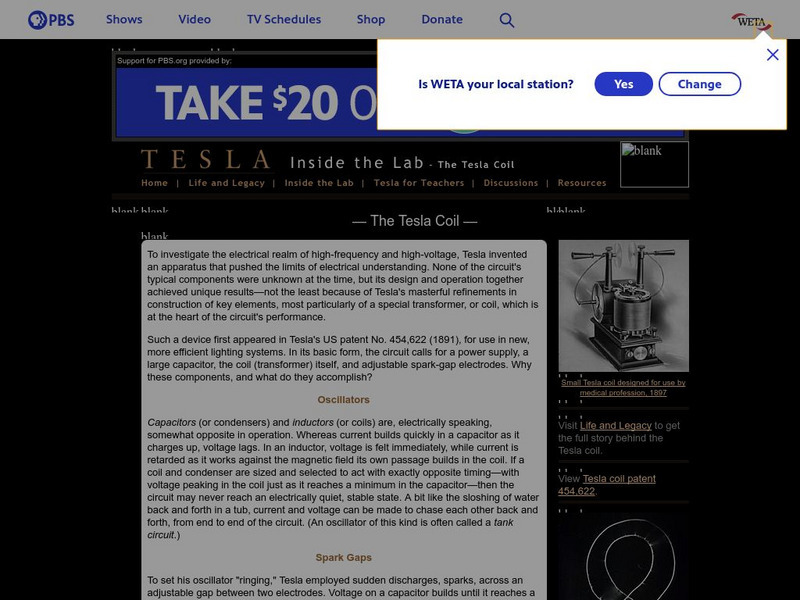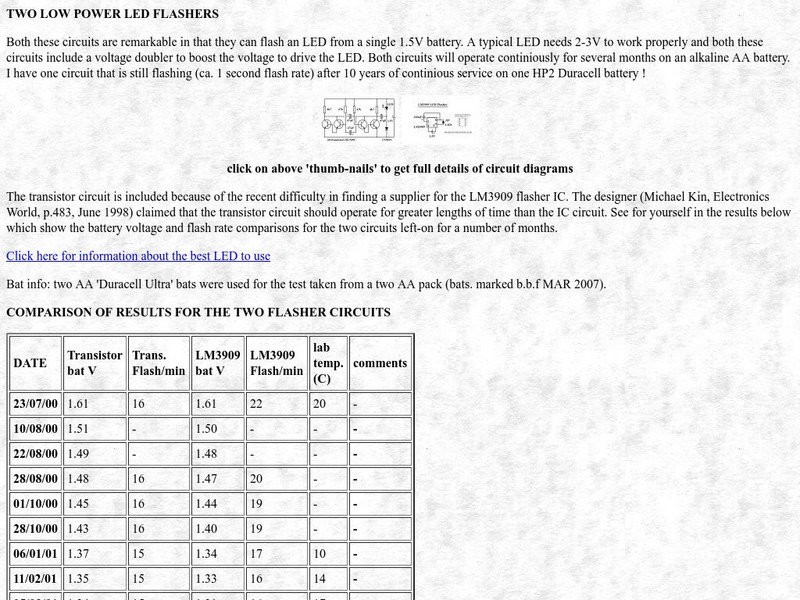Hi, what do you want to do?
Creative Science Centre
Creative Science Centre: An Electric Thermometer
Instructions for how to make an electrical thermometer. The electrical thermometer works like this - the design consists of four resistors each made from about 40 meters of very thin copper wire. The electrical resistance of wire changes...
Creative Science Centre
Creative Science Centre: Experiments With Homemade Batteries
Simple homemade batteries are described that can be made from items found in the home or school lab. These experiments help students understand how to wire them up, the origin of current, voltage and power, as well as the chemistry that...
University of Colorado
University of Colorado: Ph Et Interactive Simulations: Circuit Construction Kit (Ac+dc), Virtual Lab
With this interactive students will build circuits with capacitors, inductors, resistors and AC or DC voltage sources, and inspect them using lab instruments such as voltmeters and ammeters. Students will observe and discuss electricity...
University of Colorado
University of Colorado: Ph Et Interactive Simulations: Circuit Construction Kit (Ac+dc), Virtual Lab
Build circuits with capacitors, inductors, resistors and AC or DC voltage sources, and inspect them using lab instruments such as voltmeters and ammeters.
TeachEngineering
Teach Engineering: Potato Power
Students use potatoes to light an LED clock (or light bulb) as they learn how a battery works in a simple circuit and how chemical energy changes to electrical energy. As they learn more about electrical energy, they better understand...
TeachEngineering
Teach Engineering: Ice, Ice, Pv!
Students examine how the power output of a photovoltaic (PV) solar panel is affected by temperature changes. Using a 100-watt lamp and a small PV panel connected to a digital multimeter, teams vary the temperature of the panel and record...
TeachEngineering
Teach Engineering: Induced Emf in a Coil of Wire
Students use a simple set up consisting of a coil of wire and a magnet to visualize induced EMF. First, students move a coil of wire near a magnet and observe the voltage that results. They then experiment with moving the wire, magnet,...
TeachEngineering
Teach Engineering: Ohm's Law I
Students will work to increase the intensity of a light bulb by testing batteries in series and parallel circuits. It analyzes Ohm's Law, power, parallel and series circuits, and ways to measure voltage and current.
TeachEngineering
Teach Engineering: Put a Spark in It! Electricity
Uncountable times every day "with the merest flick of a finger"each one of us calls on electricity to do our bidding. What would your life be like without electricity? Students begin learning about electricity with an introduction to the...
TeachEngineering
Teach Engineering: Both Fields at Once?!
This lesson discusses the result of a charge being subject to both electric and magnetic fields at the same time. It covers the Hall effect, velocity selector, and the charge to mass ratio. Given several sample problems, students learn...
Concord Consortium
Concord Consortium: Stem Resources: Electric Current
In this interactive, students can explore how current, voltage, and resistance are related in a model showing the flow of electrons in an electric circuit. They will learn about Ohm's law and how other forms of energy can be made from...
CK-12 Foundation
Ck 12: Resistors in Series and Parallel
[Free Registration/Login may be required to access all resource tools.] The differences between series and parallel circuits are highlighted. Provides an in-depth look at how to solve problems about circuits and resistors. Includes a...
PBS
Pbs Learning Media: Ohm's Law
In this interactive simulation of Ohm's law, adapted from the University of Colorado's Physics Education Technology project, students will adjust the voltage and resistance in a circuit, and observe how this affects the flow of current....
PBS
Pbs: Tesla Inside the Lab the Tesla Coil
This is the PBS companion site to a video about Tesla. This particular page reviews Tesla's accomplishments and follows the events of his life that prove to be both tragic and inspiring. This comprehensive resource provides powerful...
PBS
Pbs: Tesla Inside the Lab the Tesla Coil
This is the PBS companion site to a video about Tesla. This particular page reviews Tesla's most notable invention, the Tesla coil. It's components are described as well as their general uses.
Science Struck
Science Struck: A Comprehensive List of All the Physics Formulas
Provides a long list of physics formulas for easy reference.
Texas Instruments
Texas Instruments: Add Them Up
In this activity, students explore the total voltage provided by several batteries in a series to a battery-operated device. They graph scatter plots, understand multiplication as repeated addition, and use a pattern to develop a...
Texas Instruments
Texas Instruments: Energy From Foods Part Ii
In this activity, students explore how an electrochemical cell works. They use a Voltage Sensor to measure the electrical energy produced when the distance between the electrodes is varied. They also determine the factors that affect the...
Texas Instruments
Texas Instruments: Charging Up, Charging Down: Exponential Models
In this activity, students' will use a voltage probe to collect voltage data from a discharging capacitor. They will model potential data using an exponential function.
Creative Science Centre
Creative Science Centre: Two Low Power Led Flashers
Explains the design of two circuits that can flash an LED from a single 1.5V battery. A typical LED needs 2-3V to work properly and both these circuits include a voltage doubler to boost the voltage to drive the LED. Both circuits will...
National High Magnetic Field Laboratory
Magnet Academy: Georg Ohm
Georg Simon Ohm had humble roots and struggled financially throughout most of his life, but the German physicist is well known today for his formulation of a law, termed Ohm's law, describing the mathematical relationship between...
Physics Aviary
Physics Aviary: Capacitor Properties Lab
This lab is designed to have students investigate the different changes that could be made to an air filled capacitor and the results that occur because of these changes. Students can vary the gap between the plates, the size of the...
Physics Aviary
Physics Aviary: Ohm's Law
This lab is designed to have students investigate the relationships between voltage, resistance and current in a circuit with only one passive component. This version of the lab requires students to read analog meters to get the voltage...
Physics Aviary
Physics Aviary: Capacitor Charging Through a Resistor in Dc Lab
This lab is designed to have students investigate the factors that affect the rate at which a capacitor charges. Students can change the resistance and capacitance in the circuit and monitor the current, voltage and charge on the...
Other popular searches
- Dc Voltage
- Voltage Areas
- Voltage Current
- Ac Voltage
- Voltage Resistance
- Current and Voltage
- Battery Voltage Experiment
- Voltage Drop
- Current Voltage Resistance
- Science Voltage
- Voltage Comparators
- Voltage Compartors










